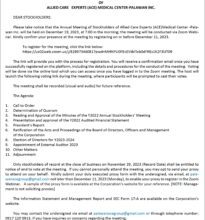Filling the gaps in corporate fiduciary duties

It is the legal obligation of every corporate officer or director to protect the best interests of the corporation. As agent entrusted with the management of the corporation, he is expected to observe the utmost level of good faith. This duty which the officer or director owes to the corporation is otherwise known as the fiduciary duty of loyalty. Thus, one cannot take advantage of his position for his own personal benefit at the expense of the corporation’s resources. Otherwise, he may be held liable for damages under the Doctrine of Corporate Opportunity.
This doctrine is enshrined in Section 33 of the Revised Corporation Code (RCC), which states that: “Where a director, by virtue of his office, acquires for himself a business opportunity which should belong to the corporation, thereby obtaining profits to the prejudice of such corporation, he must account to the latter for all such profits by refunding the same x x x.”
The adaptation of the Doctrine of Corporate Opportunity in Philippine jurisdiction is based on the recognition that a person cannot serve two hostile masters without prejudicing either of them. A director or officer cannot serve the interests of two competing companies, but must betray one or the other. In the same vein that he cannot engage a competing business as that of the corporation where he serves as a fiduciary officer for it would be improbable, if not impossible, to forego his personal interests over the effective discharge of his duties and fealty to the corporation. It is, therefore, a matter of necessity that an officer or director be prohibited from acquiring any business opportunities which fairly belong to the corporation. As directors, it is incumbent upon them to refrain from acting in a manner that contradicts the interests of the corporation.
Since the enactment of Batas Pambansa Blg. 68 or the Corporation Code of the Philippines in 1980, there were as yet no clear guidelines as to the applicability of the said doctrine. The yardstick used by the Court was that enunciated in the old case of Gokongwei v. Securities and Exchange Commission (1979) in which the Court ruled that the Doctrine of Corporate Opportunity “rests fundamentally on the unfairness, in particular circumstances, of an officer or director taking advantage of an opportunity for his own personal profit when the interest of the corporation justly calls for protection.”
Recognizing the gap in the determination of whether a transaction is indeed within the ambit of corporate opportunity, the Supreme Court laid down the parameters in a 2021 case of Total Office Products and Services (TOPROS), Inc. v. John Charles Chang, et al., G.R. Nos. 200070-71, particularly making the erring officer or director liable for damages. In said case, the Court ruled that “it is not enough to impute bare acts of transactions in which the claimant subjectively perceives the duty of loyalty to be breached.” It is material that in order for a claim of damages under Section 33 in relation to Section 30 of the RCC to prosper, the claimant must be able to sufficiently prove the following conditions:
1. The corporation is financially able to exploit the opportunity;
2. The opportunity is within the corporation’s line of business;
3. The corporation has an interest or expectancy in the opportunity; and,
4. By taking the opportunity for his own, the corporate fiduciary (i.e., corporate director, trustee, or officer) will thereby be placed in a position inimical to his duties to the corporation.
The above guidelines are patterned from the 1939 US Case of Guth v. Loft, Inc., 23 Del. Ch. 255, referred to as the Guth Test, which reckons the point when the corporate opportunity exists and when a corporate officer or director is adjudged to have breached his fiduciary duty to the corporation. The Guth Test outlines the factors that may be taken into consideration in the evaluation of the applicability of the doctrine, which factors the Court deems as appropriate in Philippine jurisdiction.
Perhaps the first task in determining whether the Doctrine of Corporate Opportunity applies is to identify whether the disputed project is, in fact, a corporate opportunity. Thus, the second parameter or the Line of Business Test seeks to establish a nexus between the corporation and the opportunity.
For such purpose, in determining whether the opportunity is within the corporation’s line of business, some of the factors that may be taken into consideration are: 1.) the quantum and place of business, 2.) the identity of products and area of competition, and, 3.) the corporate fiduciary’s business covers a substantial portion of the same markets for similar products to the extent of not less than 10% of the claimant corporation’s market for competing products.
In relation to the Line of Business Test, the Court in the TOPROS case further intimated that the involved corporations must be shown to be in competition with one another. This means to say that they must be engaged in related areas of business, producing the same products with overlapping markets. This competition, as defined in the earlier case of Gokongwei, is “a struggle for advantage between two or more forces, each possessing, in substantially similar if not identical degree, certain characteristics essential to the business sought.”
The law is clear in that the erring officers or directors should be made to account for and refund the profits which would have otherwise pertained to the corporation notwithstanding the fact that they have risked their own funds in the course of pursuing such a business opportunity. Thus, such expedient reason will not negate the liability of the officer or director for as long as the guidelines set forth in the TOPROS case have been duly substantiated.
However, the doctrine is not an iron-clad rule, as it admits an exception. Under the same provision of the RCC, the officer or director will not be deemed to have breached his fiduciary duty of loyalty to the corporation when his act has been ratified by a vote of the stockholders owning or representing at least two-thirds (2/3) of the outstanding capital stock. As clarified by the Court, the doctrine will not apply in cases where the corporation, after having been offered the business opportunities, rejects them. The refusal must be in the form of a Board Resolution demonstrating that the opportunity was brought before the corporation for its consideration, use, or exploitation but nevertheless rejected it.
With this recent development in Philippine jurisprudence, not only are courts afforded a semblance of clarity in determining the culpability of erring corporate officers and directors for their alleged disloyal acts, it also provides a reasoned approach for individuals to seek out investments while allowing corporations to protect themselves against possible opportunistic behaviors.
The views and opinions expressed in this article are those of the author. This article is for general informational and educational purposes only and not offered as and does not constitute legal advice or legal opinion.
Wildy L. Pahayahay is an associate of the Angara Abello Concepcion Regala & Cruz Law Offices (ACCRALAW), Davao Branch.
(6382) 224-0996




